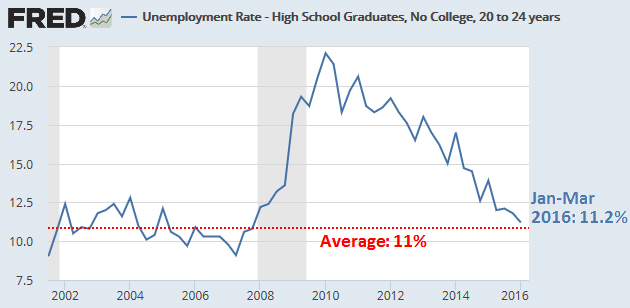From the New York Times today on the grim job prospects of high school grads with no college:
Only 10 percent of 17- to 24-year-olds have a college or advanced degree, according to a new study by the Economic Policy Institute, although many more of them will eventually graduate.
And for young high school graduates, the unemployment rate is disturbingly high: 17.8 percent….“It’s improved since the recession, but it’s still pretty poor,” said Elise Gould, a senior economist at the Economic Policy Institute, who noted the average hourly wage for high school graduates had declined since 2000 despite increases in the minimum wage in some places.
Ms. Gould is part of a growing chorus of economists, employers and educators who argue more effort needs to be put into improving job prospects for people without college degrees.
Is it unreasonable to expect reporters to hop over to FRED for five minutes and check this stuff out? I don’t know how EPI measures unemployment, but the federal government measures it in a consistent way every single month. For young high school grads, the average unemployment rate during the expansion of the aughts was around 11 percent. Today it’s 11.2 percent. In other words, it’s not “pretty poor,” it’s completely normal. And there’s no need to be grudging about how much it’s improved since the recession. It’s down by more than ten points since its peak.
It’s true that young high school grads have seen their incomes drop over the past decade: their cash earnings have declined about 7 percent since before the recession. But that’s also true of every other age and education cohort.
When it comes to both employment and earnings, young high school grads are doing about the same as everyone else. Maybe we should put more effort into improving their job prospects, but we don’t need to wildly misstate the data in order to make the case.
















